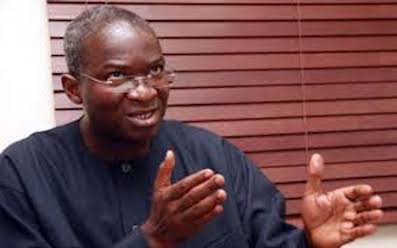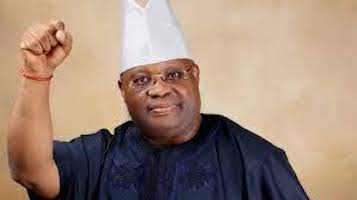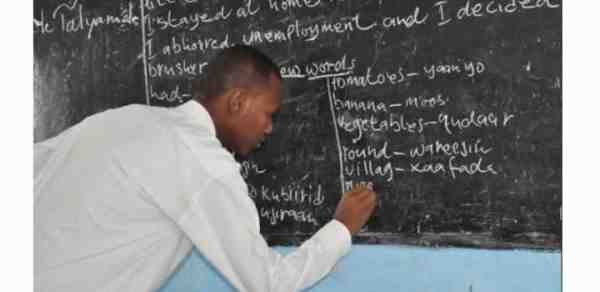NEWS
FEC Approves N4bn to Complete Kwara, Osun Roads

By Mathew Dadiya, Abuja
The Federal Executive Council (FEC) presided over by President Muhammadu Buhari has approved N4.852 billion for the completion of a road project connecting Kwara and Osun States.
The cabinet also approved N244 million for the purchase of raw materials for production of vaccines for use against animal diseases, poultry, dogs among others.
The approvals were given at the Federal Executive Council(FEC) meeting on Wednesday at the Council Chamber, Presidential Villa, Abuja.
Minister of Works and Housing, Babatunde Fashola, who spoke to State House Correspondents at the end of the meeting said part of the road contract was awarded by the previous administration.
According to him, “They relate first to Ajase/Epo/Offa/Erinle Road in Kwara State; that is the road that connects Kwara to Osun. The approval was for the 18 km section that completes the entire length of 26km of the road. All that was awarded in the previous administration was just eight km of 26 km.
“So, what we have done now is to award the 18km so that the full stretch of 26km is now under contract for the purpose of completion. That comes to a sum of N4.027 billion for the 18km stretch; the previous contract is still going on; so, this is an addendum to that contract.’’
According to him, the second road project approved by the council was the Osogbo-Ilesa Road which was awarded in 2012, but was not funded.
The minister said that the President Buhari-led administration has done 76 per cent of the entire project, adding, “What we awarded today was a variation of N825million.”
He explained: “This is to expand the original contract by three kilometers link up to Osogbo town– the built up section because it is supposed to by-pass the town.
“So, this the 3.4km that the governor requested when I went on the nation-wide road tour that we should help them connect it to Osogbo town. So, going through procurement and all of that, we finally got the approval today for N825 million to include that part.”
Asked why some of the federal roads done by the government collapsed in less than two years, Fashola explained that trucks that carrying 60,000 to 90, 000 tons had adverse impact on the roads as the designs were not menat for such tonnage.
He said efforts were being made to ensure that there was enforcement from the loading points- the ports, depots.
so that weights and measures will be checked to ensure that no vehicle exceeded 45,000 tons which is the approved axle load nationwide.
“As long as we continue to exceed and abuse with excess axle load, there is no design that you will do that will last.
“Of course, we also have a problem; most of the heavy cargo that we haul by road, no nation does it. They use rail. That is why I remain continuously optimistic and excited at what transportation is doing and what government plans to do with rail because that will be part of the final contribution to long lasting roads,’ he explained.
Also, the Minister of Agriculture and Natural Resources, Sabo Nanono, said that a contract of N244 million was approved by FEC for the purchase of raw materials for production of vaccines for use against animal diseases, poultry, dogs among others.
Nanono said, “may be, many of you are aware of the veterinary Research Institute which has been in existence for a long time probably before independence. It has been a centre for research and production of animal husbandry and also for the production of vaccines.” he said.
NEWS
Breaking: George Akume remains SGF – Presidency

The presidency says there has been no change in the status of Senator George Akume, as Secretary to the Government of the Federation.
This is according to a statement by Special Adviser to the President on Information and Strategy, Bayo Onanuga.
Mr Onanuga says President Bola Tinubu, currently in Saint Lucia, has not made any new appointments.
He described the information circulating about Akume’s replacement as untrue, adding that agents of mischief fabricated it.
GeorgeAkume
sgf
NEWS
Diri Campaigns Against Drug Abuse, Trafficking

From Mike Tayese, Yenagoa
Bayelsa State Governor, Sen. Douye Diri yesterday, led a campaign against drug abuse and illicit trafficking as part of activities commemorating the International Day Against Drug Abuse and Illicit Trafficking.
Diri advised people of the state, particularly the youths, to shun hard drugs and trafficking of illicit substances, saying they were harmful to their health and to the society.
The Bayelsa governor, who spoke shortly after the weekly Prosperity Walk exercise at the Samson Siasia Sports Complex in Yenagoa, also urged youths to develop themselves by acquiring a skill and work towards actualising their God-given potential.
“We just completed a nine to 10km walk, which is a test of our fitness. As it is said, health is wealth.
“Today is the International Day Against Drug Abuse and Illicit Trafficking. We are not only observing the global campaign, we are also leading it here in Bayelsa.
“No one in his right senses goes to commit crime and violent acts except that individuals are under the influence of hard drugs. My advice to youths is to be self-confident, have the fear of God and develop your innate potential for you to become a star.”
He implored youths to emulate the shining example of a Bayelsa-born United States-based athlete, Victory Godah, who was discovered through the state’s sports programmes.
He commended her gesture of donating sporting equipment as a way of giving back to the state.
“Victory Godah from Ekeremor local government area was discovered here and because of her skill, she is now at the University of Minnesota, United States. She has given back to the state through sports equipment so that more of us can have that access.”
In his remarks, the Commissioner for Health, Prof. Seiyefa Brisibe, emphasised the importance of the weekly walk, stating that participants above 40 years would have their blood pressure controlled after taking about 5,000 steps.
Also, state chairman of the Drug Abuse, Addiction, Prevention and Rehabilitation Committee, Dr Peter Owonaro, said the committee’s outreach in the state had been a huge success, noting that a recent research indicated that the drug abuse prevalence rate in Bayelsa dropped by five per cent from 21.4 per cent.
Also, the state commander of the National Drug Law Enforcement Agency (NDLEA), Kanu Sunny, lauded the state government for its unprecedented support in the fight against drug abuse and trafficking.
He said the campaign was taken to secondary schools as well as tertiary institutions and encouraged all to join in the war against the menace.
Foreign News
Ally of Cameroon President, 92, Quits ‘Broken’ Government to Challenge Him

Issa Tchiroma Bakary – a prominent minister and long-time ally of President Paul Biya – has quit Cameroon’s government, in the hope of ending 92-year-old Biya’s four-decade grip on power in upcoming elections.
Just four months before the central African nation went to the polls, Tchiroma said the Biya administration he belonged to had “broken” public trust and he was switching to a rival party.
“A country cannot exist in the service of one man,” he said on Wednesday.
While he was communications minister, Tchiroma notably came under fire for denying – then backtracking on his denial – that Cameroonian soldiers had killed women and children in a viral video.
His other roles during almost two decades in government include being a spokesman for the Biya government, and, until his resignation on Tuesday, he was employment minister.
Paul Biya – the world’s oldest head of state – has yet to confirm if he will attempt an eighth term as president. Last year, the country banned reports on the president’s health following rumours he had died.
As this election approaches, high unemployment and soaring living costs are of concern to many Cameroonians, as are corruption and security. A separatist insurgency in the English-speaking provinces as well as jihadists operating in the northernmost region have forced many thousands of Cameroonians from their homes in the past decade.
Cracks in Tchiroma’s relationship with President Biya were blown open earlier this month, when he told crowds in his home city of Garoua that Biya’s time in power had not benefited them in any way.
Tchiroma, widely reported to be 75, continued this criticism in a 24-page manifesto released a day after his resignation – promising to dismantle “the old system” so that Cameroon could move beyond “abuse, contempt, and the confiscation of power”.
One of his proposed solutions is federalism – he is offering to hold a referendum on devolving more power to Cameroon’s 10 provinces. This has long been mooted by many as a solution to the country’s so-called Anglophone crisis.
Specifically addressing English-speaking Cameroonians, who have long complained of marginalisation and discrimination in Francophone-dominated public institutions, he said “you do not need people to speak for you – you need to be listened to” and that “centralisation has failed”.
Tchiroma also used his manifesto to say Cameroon “has been ruled for decades by the same vision, the same system. This model, long presented as a safeguard of stability, has gradually stifled progress, paralysed our institutions, and broken the bond of trust between the state and its citizens”.
As the October presidential election approaches, rights groups have condemned the government’s crackdown on dissent.
Shortly after Tchiroma announced his plans to run for the presidency, the government reportedly announced a ban on all political activities by his Cameroon National Salvation Front (CNSF) party in a sub-district of the Far North region – a part of the country where he is said to be an influential power-broker.
Weeks earlier, fellow presidential hopeful Maurice Kamto had his movements curtailed during a two-day police stakeout in Douala, after promising supporters at a rally in Paris that he would protect Biya and his family if he wins in October.
Parliamentary elections that were also supposed to take place earlier this year have been delayed until 2026.
Reaction to Tchiroma’s presidential bid has been mixed – some think he is canny.
“By positioning himself as the elder statesman who ‘saw the fire coming’, Tchiroma is hedging that his break with Biya will be seen as bold – not opportunistic,” Cameroonian analyst and broadcaster Jules Domshe said.
“From economic fallout to youth unemployment, insecurity, and growing unrest in the North-West, South-West, and Far North [regions], Cameroon is ripe for change.”
Opposition voices are divided – some want Tchiroma to support Kamto, who was the runner-up in 2018 with 14% of votes. But others say he is tainted by his long association with Biya.
“He cannot embody change… He was part of the system for too long. The youth do not trust him,” says Abdoulaye Harissou, a legal notary and prominent critic once detained by the government.
Another member of the opposition – Jean Michel Nintcheu of the APC coalition – simply said: “We don’t see Tchiroma as a potential winner.”
| ReplyReply allForwardAdd reaction |



























